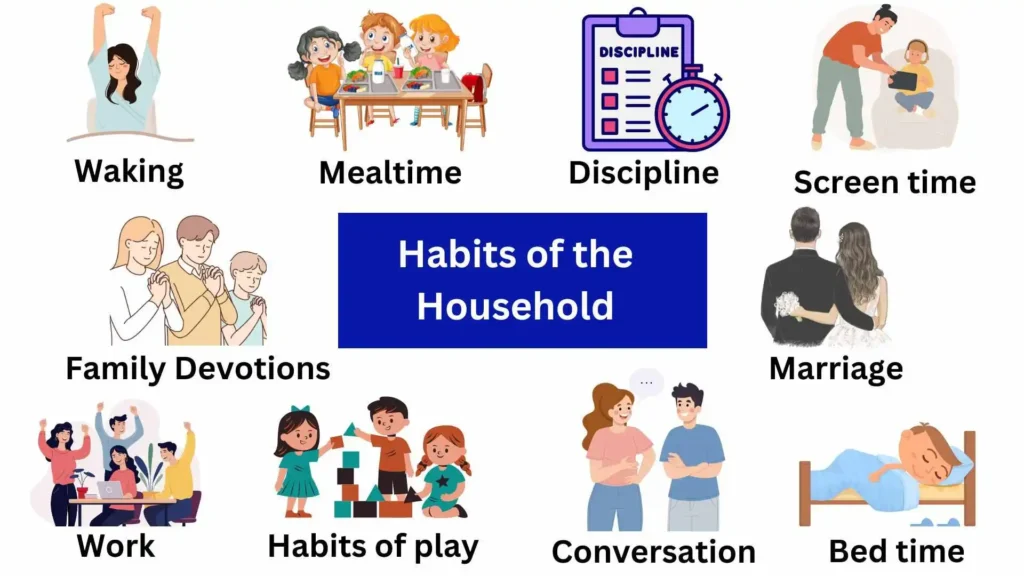Habits of the Household by Justine Whitmel Early is an interesting book about family habits. The title of the book is “Habits of the Household: Practicing the Story of God in Every Family Rhythms”.
The book is centered around ten habits of the house that play a crucial role in family life. Do you want to live a happy life with your children following a regular schedule of essential habits? Continue reading here.
What is the most required habit for a healthy family? Do you know the habit of conversation and how important it is? For a family to function well, the habit of conversation is vital.
Explore the art of family habits in the following section.
Table of Contents
Habits of the Household Book Review
The book is based on a single figure. This figure represents the whole idea and story of the book. The writer discusses ten areas and habits of the household. The figure acts as an outline for the book’s contents, thereby covering the family’s habits one by one.
- habits of waking
- habits of mealtime
- Discipline
- Screen time
- Family devotions
- Marriage
- Work
- Play
- Conversation
- Bedtime
All the habits are divided into three main categories. They are
- Habits of Forming Parents
- Habits of Forming Family
- Habits of Forming Children
All the habits fall into one of the above three categories. Each of the habits given in the book can be shown in the table as
| Forming Parents | Forming Family | Forming children |
|---|---|---|
| Habits of waking Habits of marriage | Habits of mealtimes Habits of work Habits of play Habits of conversation | Habits of discipline Habits of screen time Habits of family devotions Habits of bedtime |
The whole book is just this table. Justine Whitmel Early gives a circular figure at the very beginning of the book, summarizing all the ideas and household habits. In simple words, all the habits are different facets of any household where they are interdependent.
For example, the habit of waking helps develop and get into the habit of work. Similarly, the habits of marriage and family devotion are interdependent. So, all the habits exist in a loop where you cannot remove them.
Also, read the review of the 7 Habits of Highly Effective Teens by Sean Covey.
Habits of the Household
Do you want to explore the habits of the household more? As this book has ten enjoyable and meaningful habits, each will help you know your household life intricately. These habits are new experiences because you know but don’t practice them.
Let’s understand and remember Household habits one by one.

1. Habits of Waking
Habits of waking are a starting point for knowing or waking to reality. Start your morning with some kind of spiritual disincline. You may be practicing certain wake-up habits, but try to adapt to some new ones to enhance learning and achieve more success.
Set a proper schedule in the morning by consulting with your spouse or children. Some of the tips you can use for waking are given as
- Set the alarm for notification. Observe discipline and follow the alarm. Keep your phone aside while sleeping so it does not disturb you.
- The first thing after waking is to thank the lord. Offer gratitude to God for being alive again. For example, bless us as we study, work, or plan today; my lord, thank you for this day.
- Ignore using your phone in the morning; instead, go for meditation, to the scriptures, or the holy places.
- Reading and prayer should be your guide and norm on waking. Follow a reading plan. Read briefly but effectively with your spouse or others.
- Develop the habit of reading in the morning. Let it rule your day and your whole life.
- Be flexible while deciding the form of material. For example, printed and hard Bibles are easy to read, but you can also use online apps or PDF versions.
- If you have difficulty developing this habit, try communicating with your spouse or friends. They can assist you in forming any habit.
Avoiding screens and rushing to prayer is a positive sign that shows morning and spiritual discipline.
2. Habits of Mealtimes
Habits of mealtimes are also discussed in the Habits of the Household book. Meal is a source of energy and a means of making or forming relationships.
The main idea in this habit is to come to the table and eat together. Build healthy eating habits and invite your children and other family members to join you and enjoy the meal.
Table and mealtime turn strangers into friends. It is on the table that you see solutions for the problems. All the members contribute to a solution. In this way, mutual sympathy and respect increase within the family.
Conversation Habits for the Table
Children learn what they observe in the house and their surroundings. Teach and practice the best habits of the house to your children. Some of the habits of conversation on the table are given as
- Using devices such as phones, laptops, etc, at the table is unethical and disturbing. It is the place to connect. Try to keep your devices on silent mode and give time to children.
- Ask questions from all who are present at the table. Make them feel involved in the conversation. Allow everyone to answer the same questions. Don’t scold someone for answering wrong.
- If the family is big, try to follow one conversation rule. It means asking everyone about a single aspect of the question, not all the multiple sides. For example, ask about one good and one bad thing, and so on.
- Children learn best through stories. Try to tell some stories about your life that can motivate them or help them by giving examples of family habits. They can learn the stories at the table.
- Ask simple and specific questions. For example, what do you expect of the day, what is the plan for today, what was best, what made your day, and so on?
Hospitality and the Table
- Hospitality is another best gift for mealtimes. Try to expand the limits of your house by inviting people to the table. Try the things for hospitality.
- According to the habits of household books, accommodate an extra chair in your drawing room if you can. Welcome guests and offer good hospitality.
- Keep your food and menu simple. Invite them for good company, not just to eat the meal. The purpose is to befriend, not to impress.
- Inviting guests means sharing a household with them, not just entertaining them. So ask with care.
- In the case of a large family, invite guests once a week or month
- Avoid eating during anger, as it can affect eating habits.
As all the habits of the household are interdependent, the next step is to learn to get into the above two habits. It is the turn of discipline now.
3. Habits of Discipline
Discipline is the key to success. It is also one of the great habits of the house that you can adapt. A moment of discipline can make the life of discipleship. Most of the time, parents use discipline as a controlling agent for their children.
Don’t control your kids; instead, make them control their lives. It can be done through discipline. Instead of fostering anger and wrong instincts, love your children and prepare them for discipleship. It is the responsibility of parents to teach discipline and influence their children.
Develop and teach reconciliation to your children. Always think about the results and ending. This type of behavior will produce a better lifestyle for the kids. Discipline is a difficult task to achieve, but the consequences are more fruitful than complex.
4. Habits of Screen Time
The screen is an unavoidable part of today’s life. You get most of the news, reports, updates, instructions, and learning through screens.
Adopt Rhythms of On-time and Off-time to Limit Screens
Adopting rhythms of on-time and off-time is one example of a family habit. Decide on and off screen time and then tell the children what they are. Also, talk about the importance of this decision.
- Try these things for on-time
Select free nights, one night a week for family movies, Sunday morning cartoons, etc., for on-time screens.
- Try these things for off-time
Allocate driving or riding a car, Friday outings, Sunday sports on the ground, Saturday dinner tables, reading the bestseller short stories, reading Sunday magazines, etc., for off-time screens.
While deciding on time for the screen, engage yourself in an interesting activity. Don’t use your phone or devices, and enjoy the offline world.
Leaving screens or deciding on off-screen time is difficult, but as a parent, you should sacrifice something for your children. Off-screen time is the effort to make the children the way God created them and wants them to be.
5. Habits of Family Devotions
Family devotions are essential for spiritual lives to go beyond the church walls to practice active, thriving faith. As far as family devotions are concerned, practicing something rather than nothing is required.
Teaching simple truths and praying short prayers are the most powerful rhythms and habits of the household a family can practice.
You cannot create a perfect moment or teach an ideal lesson plan because God loves messy things. You can do the following activities.
- Look for times when you are already with each other.
- Practice things together, especially when memorizing lessons or verses.
- Read stories from children’s books and then try to share one thing you liked about it.
- It ends with each person saying something they need and praying to God.
- Children absorb things the way we do; our actions influence them, so be sincere and careful about your words and actions.
Things to Try for Telling Simple Truths
- Try reading or memorizing some lines of a spiritual story. Start with one question and response a week; it is an ideal start.
- Go through the lord’s prayer or apostle’s creed while explaining the concepts.
- Memorize scriptures through music and learn best through it.
Things to Try for Praying Short Prayers
- Pray before a meal.
- Try to pray together when you are in need.
- Praying before school or early morning and before bed is very good.
- Pray for those who need your and your prayers.
6. Habits of Marriage
The base of love in the family is the vow of marriage. The bond of love sets us free and truthful in the family. Marriage habits are the essential habits of the house.
“The story of love begins and ends in a wedding.” You can try the following things.
- Specify a night to practice your love. Name a night of the week and then act with strong intentions over it so that you can repeat it every week regularly.
- Out of the home, place is optional. You can set a place inside your home to have feelings of love for each other.
- Decide and plan about family matters and kids—plan for birth gap and parenting.
- Establish a strong mental and physical connection on this night.
People ask many questions on date night, but I love the following ones.
- How do you see Jesus in your imaginative picture?
- What is the best thing I can do to love you more?
- What is the most interesting thing you read, listen or watch?
- What recent habit or action makes you proud?
7. Habits of Work
It is said that humans were created for good work. As a parent, you must teach your children the integrity and dignity of good work. What should be done inside and outside, and what household habits should they work on?
How to Invite Children to the Habits of the House
Follow the things given below to encourage your children to adopt household habits.
- Always beautify and dignify the work that needs to be done.
- Be open to the mistakes of children. Allow them to do things themselves if they can do. Only do work for them if they can do it.
- Try to teach the work as early as possible. This will help them learn at a younger age and know their responsibilities.
- Allow them to deal with and care for guests. They should learn to respect guests, offer drinks and food, and clean up afterward.
- Reward your children even for small tasks. Appreciate them and don’t burden them with inappropriate chores. Also, they should be taught how to reward themselves for good habits.
- Make sure the children work alongside you. They can work and learn best when you love them while working.
- Teach them how to be flexible in work. Inflexibility is one of the habits of disengaged employees.
- If the work is outside the home, let them decide whether they want to go or not. Also, you should see if they can do the work or not. Consider whether you can bring them or not.
- Explain to them why work is important or why they should take part in work.
- Always encourage them to help you with your work.
- Apply the age-appropriate chore.
8. Habits of Play
Play or entertainment is the natural fundamental right of every child. Play and sports add meaning, joy, and fun to your life. Without play, there can be no valuable progress. The best way to resist diseases and harmful activities is by playing.
So, play becomes an essential habit in the household. It would help to balance the chores and other activities to make time for sports, music, or anything else that brings joy and fun. When you immerse yourself in the world of play, you enter the kingdom of fun.
Some people read books for fun which contain musical stories. Some of those books are:
- The Wing Feather Saga by Andrew Peterson
- The Chronicles of Narnia by C.S Lewis
- Owl Moon by Jane Yolen
- The Snowy Day by Ezra Jack
Cultivating the Habits of Play
How can you build children’s play habits? I have got the answer. Try the following steps.
- Could you show them your presence? If you are at home, then it’s perfectly fine to interact with children.
- Parents living outside or far from home should make time every day for their children. Call and talk to them so they can listen and understand you.
- Teach them how to play or how to behave while playing with you and playing with their fellows.
- During playtime, focus and get engaged with them. Don’t feel guilty or forcefully drawn here.
The significant benefit of playing with children is that the conversational gap between you and your children shrinks. As a result, they can share everything about themselves. Let’s read the habit of conversation to understand it in detail.
9. Habits of Conversation
A good conversation is the first step and reason for a good relationship. It turns friends into family and vice versa. If you can teach habits of conversation to your kids, you can teach them habits of friendship.
The most crucial factor in developing a good conversation with anyone is to know or identify the time. It means when you should talk to them, ask them about their lives or anything you want to know.
There are specific times of conversation. For example, ask them while driving together, during family trips, house projects, after bedtime, when taking one-on-one meals, etc.
In Habits of Household, the following things for a better conversation are mentioned for you:
- Set a separate room where you and the children can sit. The room should be comfortable and peaceful.
- Look for a room without a TV. Keep your devices and phone aside and silent.
- Light or fire a candle. Stay around it and start with a joke to make them laugh.
- A conversation is the learned art of friendship, whether inside or outside the home.
- Ask them about the day. How was the day, best or bad? What did they learn? Was there anything new? There were many other similar questions.
- Ask them about life. How is life going? What are their goals for life? How do they want to live life? What are they good at?
10. Habit of Bedtime
Bedtime habits are the last but not the least important habit of the house. It is the time when you can seek reconciliation with the child. It is the time to tell your child that God loves us more than our tired and busy lives.
Acknowledge the blessings of God and thank him for the grace and rest.
- Pray for your child and make him feel relaxed and in love.
- May they grow wise, responsible, active, and learned.
- Tell him how much you love him. Try to make him laugh.
- Appreciate his efforts in the chores to further his responsibility.
- See in his eyes and keep him in your heart.
- Bless all parts of their body.
Final Thoughts
Family habits are a crucial part of our life. These habits remind us of the boundless love among family members. Without the habits of the household, there can be no real joy and happiness. The habits of the house are a beacon of hope for a better tomorrow.
Habits of the Household book defines ten habits that form a strong family relationship. Adopting these habits is a sign of a happy and connected life. Each of these habits contributes to building another and ultimately gives you a sense of joy.




